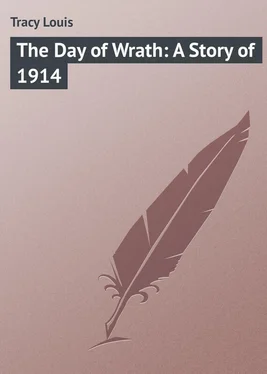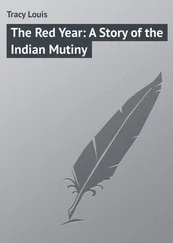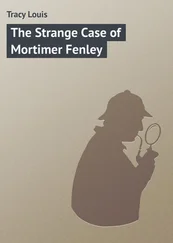Louis Tracy - The Day of Wrath - A Story of 1914
Здесь есть возможность читать онлайн «Louis Tracy - The Day of Wrath - A Story of 1914» — ознакомительный отрывок электронной книги совершенно бесплатно, а после прочтения отрывка купить полную версию. В некоторых случаях можно слушать аудио, скачать через торрент в формате fb2 и присутствует краткое содержание. Жанр: foreign_prose, на английском языке. Описание произведения, (предисловие) а так же отзывы посетителей доступны на портале библиотеки ЛибКат.
- Название:The Day of Wrath: A Story of 1914
- Автор:
- Жанр:
- Год:неизвестен
- ISBN:нет данных
- Рейтинг книги:5 / 5. Голосов: 1
-
Избранное:Добавить в избранное
- Отзывы:
-
Ваша оценка:
- 100
- 1
- 2
- 3
- 4
- 5
The Day of Wrath: A Story of 1914: краткое содержание, описание и аннотация
Предлагаем к чтению аннотацию, описание, краткое содержание или предисловие (зависит от того, что написал сам автор книги «The Day of Wrath: A Story of 1914»). Если вы не нашли необходимую информацию о книге — напишите в комментариях, мы постараемся отыскать её.
The Day of Wrath: A Story of 1914 — читать онлайн ознакомительный отрывок
Ниже представлен текст книги, разбитый по страницам. Система сохранения места последней прочитанной страницы, позволяет с удобством читать онлайн бесплатно книгу «The Day of Wrath: A Story of 1914», без необходимости каждый раз заново искать на чём Вы остановились. Поставьте закладку, и сможете в любой момент перейти на страницу, на которой закончили чтение.
Интервал:
Закладка:
“How far are we from Visé?” he asked the driver.
The man pointed with his whip. “You see that black knob over there?” he said.
“Yes.”
“That’s a clump of trees just above the Meuse. Visé lies below it.”
“But how far?”
“Not more than two kilomètres.”
Two kilomètres! About a mile and a half! Dalroy was tortured by indecision. “Shall we be there by daybreak?”
“With luck. I don’t know what’s been happening here. These damned Germans are swarming all over the place. They must be making for the bridge.”
“What bridge?”
“The bridge across the Meuse, of course. Don’t you know these parts?”
“Not very well.”
“I wish I were safe at home; I’d get indoors and stop there,” growled the driver, chirping his team into motion again.
Dalroy’s doubts were stilled. Better leave this rustic philosopher to work out their common salvation.
A few hundred yards ahead the road bifurcated. One branch led to Visé, the other to Argenteau. Here was stationed a picket, evidently intended as a guide for the cavalry.
Most fortunately Dalroy read aright the intention of an officer who came forward with an electric torch. “Lie as flat as you can!” he whispered to Irene. “If they find us, pretend to be asleep.”
“Hi, you!” cried the officer to Maertz, “where the devil do you think you’re going?”
“To Joos’s mill at Visé,” said the gruff Walloon.
“What’s in the cart?”
“Oats.”
“ Almächtig! Where from?”
“Aachen.”
“You just pull ahead into that road there. I’ll attend to you and your oats in a minute or two.”
“But can’t I push on?”
The officer called to a soldier. “See that this fellow halts twenty yards up the road,” he said. “If he stirs then, put your bayonet through him. These Belgian swine don’t seem to understand that they are Germans now, and must obey orders.”
The officer, of course, spoke in German, the Walloon in the mixture of Flemish and Low Dutch which forms the patois of the district. But each could follow the other’s meaning, and the quaking listeners in the middle of the wagon had no difficulty at all in comprehending the gravity of this new peril.
Maertz was swearing softly to himself; they heard him address a question to the sentry when the wagon stopped again. “Why won’t your officer let us go to Visé?” he growled.
“Sheep’s-head! do as you’re told, or it will be bad for you,” was the reply.
The words were hardly out of the soldier’s mouth before a string of motor lorries, heavy vehicles with very powerful engines, thundered up from the rear. The leaders passed without difficulty, as there was plenty of room. But their broad flat tires sucked up clouds of dust, and the moon had sunk behind a wooded height. One of the hindermost transports, taking too wide a bend, crashed into the wagon. The startled horses plunged, pulled Maertz off his perch, and dragged the wagon into a deep ditch. It fell on its side, and Dalroy and his companion were thrown into a field amid a swirl of laden sacks, some of which burst.
Dalroy was unhurt, and he could only hope that the girl also had escaped injury. Ere he rose he clasped her around the neck and clapped a hand over her mouth lest she should scream. “Not a word!” he breathed into her ear. “Can you manage to crawl on all-fours straight on by the side of the hedge? Never mind thorns or nettles. It’s our only chance.”
In a few seconds they were free of the hubbub which sprang up around the overturned wagon and the transport, the latter having shattered a wheel. Soon they were able to rise, crouching behind the hedge as they ran. They turned at an angle, and struck off into the country, following the line of another hedge which trended slightly uphill. At a gateway they turned again, moving, as Dalroy calculated, on the general line of the Visé road. A low-roofed shanty loomed up suddenly against the sky. It was just the place to house an outpost, and Dalroy was minded to avoid it when the lowing of a cow in pain revealed to his trained intelligence the practical certainty that the animal had been left there unattended, and needed milking. Still, he took no unnecessary risks.
“Remain here,” he murmured. “I’ll go ahead and investigate, and return in a minute or so.”
He did not notice that the girl sank beneath the hedge with a suspicious alacrity. He was a man, a fighter, with the hot breath of war in his nostrils. Not yet had he sensed the cruel strain which war places on women. Moreover, his faculties were centred in the task of the moment. The soldier is warned not to take his eyes off the enemy while reloading his rifle lest the target be lost; similarly, Dalroy knew that concentration was the prime essential of scout-craft.
Thus he was deaf to the distant thunder of guns, but alive to the least rustle inside the building; blind to certain ominous gleams on the horizon, but quick to detect any moving object close at hand. He made out that a door stood open; so, after a few seconds’ pause, he slipped rapidly within, and stood near the wall on the side opposite the hinges. An animal stirred uneasily, and the plaintive lowing ceased. He had dropped the sabots long since, and the lamp was lost in the spill out of the wagon, but most fortunately he had matches in his pocket. He closed the door softly, struck a match, guarding the flame with both hands, and looked round. He found himself in a ramshackle shed, half-barn, half-stable. In a stall was tethered a black-and-white cow, her udder distended with milk. Huddled up against the wall was the corpse of a woman, an old peasant, whose wizened features had that waxen tint of camailleu gris with which, in their illuminated missals of the Middle Ages, the monks loved to portray the sufferings of the early Christian martyrs. She had been stabbed twice through the breast. An overturned pail and milking-stool showed how and where death had surprised her.
The match flickered out, and Dalroy was left in the darkness of the tomb. He had a second match in his hand, and was on the verge of striking it when he heard a man’s voice and the swish of feet through the grass of the pasture without.
“This is the place, Heinrich,” came the words in guttural German, and breathlessly. Then, with certain foulnesses of expression, the speaker added, “I’m puffed. That girl fought like a wild cat.”
“She’s pretty, too, for a Belgian,” agreed another voice.
“So. But I couldn’t put up with her screeching when you told her that a bayonet had stopped her grandam’s nagging tongue.”
“ Ach, was! What matter, at eighty?”
Dalroy had pulled the door open. Stooping, he sought for and found the milking-stool, a solid article of sound oak. Through a chink he saw two dark forms; glints of the dawn on fixed bayonets showed that the men were carrying their rifles slung. At the door the foremost switched on an electric torch.
“You milk, Heinrich,” he said, “while I show a glim.”
He advanced a pace, as Dalroy expected he would, so the swing of the stool caught him on the right side of the head, partly on the ear and partly on the rim of his Pickel-haube . But his skull was fractured for all that. Heinrich fared no better, though the torch was shattered on the rough paving of the stable. A thrust floored him, and he fell with a fearsome clatter of accoutrements. A second blow on the temple stilled the startled oath on his lips. Dalroy divested him of the rifle, and stuffed a few clips of cartridges into his own pockets.
Then, ready for any others of a cut-throat crew, he listened. One of the pair on the ground was gasping for breath. The cow began lowing again. That was all. There was neither sight nor sound of Irene, though she must have heard enough to frighten her badly.
Читать дальшеИнтервал:
Закладка:
Похожие книги на «The Day of Wrath: A Story of 1914»
Представляем Вашему вниманию похожие книги на «The Day of Wrath: A Story of 1914» списком для выбора. Мы отобрали схожую по названию и смыслу литературу в надежде предоставить читателям больше вариантов отыскать новые, интересные, ещё непрочитанные произведения.
Обсуждение, отзывы о книге «The Day of Wrath: A Story of 1914» и просто собственные мнения читателей. Оставьте ваши комментарии, напишите, что Вы думаете о произведении, его смысле или главных героях. Укажите что конкретно понравилось, а что нет, и почему Вы так считаете.












